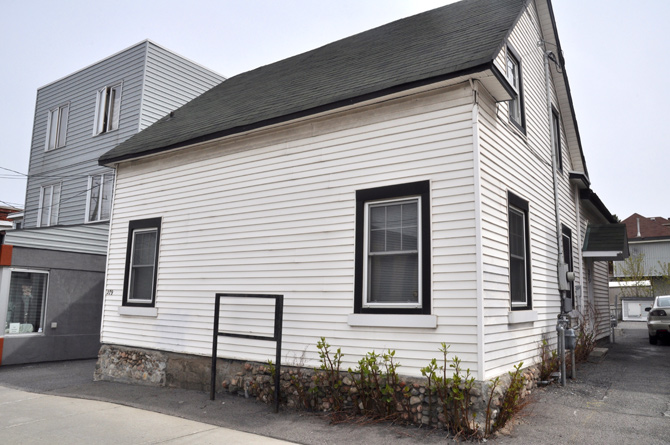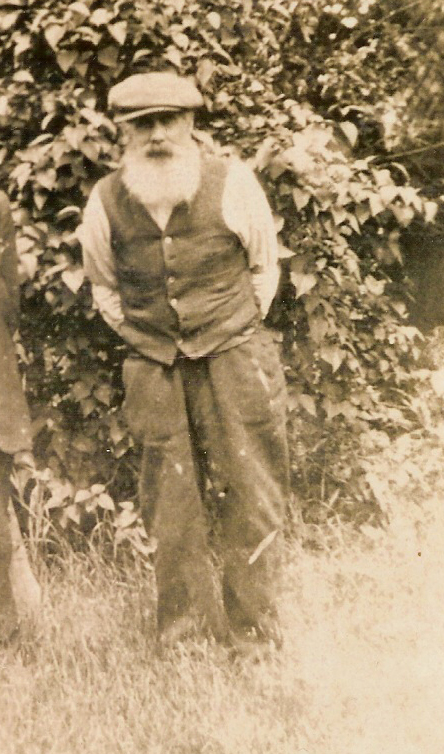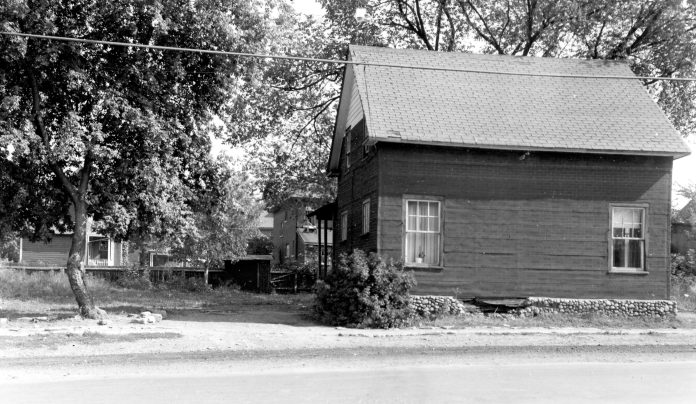Kitchissippi comprises multiple neighbourhoods, each of which has its own story of early development. The ward developed like a quilt, each small section built up gradually at different rates over a period of about 80 years, until by 1950, it was all part of the City of Ottawa.
In the 1870s, both the western and eastern ends of what would become Kitchissippi were beginning to develop, though completely independent of each other and for completely different reasons: Hintonburg grew due to the establishment of railroads and the need for workers and Westboro grew due to the establishment of a sawmill.
Skead’s Mill was opened by Senator Hon. James Skead in mid-1870. Once located near present-day Westboro Beach, this steam-powered sawmill was constructed on a site that was strategically chosen due to cheap land and proximity to the new westward Canada Central Railway line. A fire in November 1871 destroyed the mill. Skead rebuilt it a year later, making the mill even larger. As he did so, the village nearby began to grow.
The Birch family acquired the land east of Churchill in 1838 and built a farmhouse by Richmond Road between what is now Eden and Edgeworth. They farmed the land for 30 years. In 1869, the elderly patriarch, Thomas Birch, deeded the Birch farm in parts to three of his sons. The traffic humming on Richmond Road, trains travelling through the farm, and the new mill, were all a boon to the area. One enterprising son, Richard Birch, laid out Westboro’s first subdivision. The August 1872 plan laid out 28 lots between Richmond and Scott, Churchill and Winona. It was a small subdivision, but enough to get the hamlet of Birchton growing. Mill workers began to construct simple homes and a community was born.
By the summer of 1873, a need had developed for commerce in the hamlet. Richard’s sister, Jane Birch, was 33 years old, and she too had an eye for business. Jane acquired one of Richard’s lots fronting on to Division Road (now Churchill Avenue) that was set back about 200 feet from Richmond Road and had a modest wood-frame home built on a stone foundation. This house was to serve two purposes: Jane would reside in it, but more importantly, in late 1873, she would open Westboro’s first retail store. Few details have survived, but Jane’s grocery store would have been very simple, just enough to serve the 200 or so workers of the mill.
Incredibly, this house still stands at 379 Churchill Avenue. It’s likely that the original shop was at the front of the house, the door to which has long been covered over. The side entrance was used to access the dwelling portion and now serves as the main entrance.

Around this time, a 28-year-old farmer named Pierre (Peter) Paysant arrived on the scene. Pierre had escaped a difficult life back home in France. He was born and raised in Tromborn, a small village in the Alsace-Lorraine territory, which was a long-time battleground between France and Germany. While fighting in the Franco-Prussian War (1870-1871) and defending his home region from Germany, Pierre had been captured and held prisoner. He later escaped to Paris, but after the French lost the war, all French citizens in Alsace-Lorraine were required to choose between leaving the region or accepting German citizenship. Pierre refused to return home and like many of his countrymen, chose to come to Canada. Thus, Pierre Paysant started his new life in rural Nepean Township.

He arrived in Birchton around 1873 and leased 20 acres of farmland from Rice Honeywell, the eldest son of Nepean’s first settler, Ira Honeywell. The property, which included Rice’s original family home, was located alongside what is now Carling Avenue, just west of Churchill.
Pierre and Jane Birch met, and later married in September of 1876. From that point forward ,Pierre was listed as the storekeeper though undoubtedly Jane was still intimately involved. The couple had three children within the next five years, the last coming along when Jane turned 41. Their son died in infancy, but two daughters survived to live long lives.
Meanwhile, in May 1874, Rebecca Pratt, a recent widow, opened a second grocery store for the thriving area at the northwest corner of Birch Street (now Winona) and Richmond Road, now the site of Avenues Garage. Rebecca was also successful in landing the location of the first post office for the west end (given the name “Skead’s Mills” by residents to honor Senator Skead). The Pratt store would outlast the Paysants, but just barely.
The Paysants remained in operation until approximately 1890. At that point, the economy of Skead’s Mills had come to a standstill. A fire in July 1888 destroyed the mill, and with streetcars still another ten years away there was little prosperity, nor prospect, within the village. Most shops closed, leaving only a hotel and Pratt’s shop (then operated by John Falls). To make ends meet, Pierre went back to farming, and, piece-by-piece, acquired much of the land on the south side of Richmond Road, east of Churchill, going back as far as about Kenwood. His 18 acres also came to be known as a scenic community hub. A turn-of-the-century article noted that “situated upon the property is a grove, which is the beauty spot of the neighbourhood.”
The Paysants would have lived an extremely modest life; the family’s annual income was listed on the 1901 Census as $352. It was through their investment in vacant Westboro land that their fortune was made. They sold the 18-acre property in 1909 for $20,000 when Westboro real estate was booming.
Jane Birch passed away in 1920 at age 80, having spent her entire life in Westboro. Pierre died in 1929. The Paysant name did not continue but their two daughters became matriarchs to the sizable LaSalle and Dunn families. Some of their descendants still reside in the neighbourhood.
The Paysant home on Churchill remained in the family for 75 years. It was briefly owned by Nepean Fire Chief Harry Snider in the late 40s, followed by the Stamler family in 1953. It would remain in their hands well into the 21st century. It has most recently been used as a commercial space for a bookkeeping company, but that appears to have changed within the last year.
Shockingly, this important piece of Westboro history has no heritage designation. Perhaps even more unfortunate is that the important Birch name, particularly that of trailblazer Jane Birch, has been forgotten as well.
Dave Allston is a local historian and the author of a blog called The Kitchissippi Museum. His family has lived in Kitchissippi for six generations. Do you have early memories of the area to share? We’d love to hear them! Send your email to stories@kitchissippi.com.
